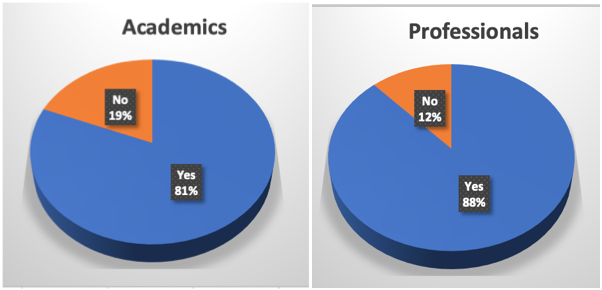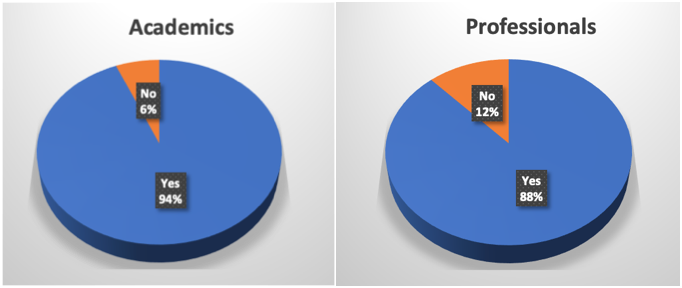New Member Preliminary Survey Results
In November, AUFA’s Membership Engagement Committee (MEC) sought feedback from new AUFA members about their experiences of joining AU. This short survey was the first step in what will be a deeper look at the needs of new AUFA members.
Thirty-three AUFA members who were hired after January 1, 2019 responded, with an even split between new academic and new professional members. With one exception, the results were similar for academic and professional members. Key themes include:
New AUFA members did not have enough information to effectively negotiate an offer.
AU provided inadequate orientation to their jobs and to the organization.
New AUFA members struggled to self-orient because of inadequate and incorrect documentation and the absence of mentors.
Social isolation has intensified the challenges faced by new AUFA members.
In the spring, MEC members will be undertaking more in-depth interviews with AUFA members about their onboarding experiences.
Negotiations at Hire
Q1. During your hiring, did you have enough info to negotiate an offer effectively with AU?
The vast majority of members identified that they lacked information during the hiring process, and this affected their ability to negotiate. Negotiations are important because starting salaries are the pivotal factor in life-time earnings.
In their comments, respondents reported that AU would not answer questions, was unwilling to meaningfully negotiate, and refused to provide support to members having to relocate. Members also flagged that, when they became aware that their starting salaries were inequitable, there was no meaningful remedy available to them.
Orientation to Job
Q2. During your first two weeks on the job, were your job specific duties adequately explained to you?
Q3. Do you know the criteria against which your performance will be judged at the end of your probationary period?
In their comments, many respondents emphasized that their orientation to their jobs was inadequate. This included tasks, duties and how their work fit into the organization which was not explained or shifting as time went on. What information was provided was provided in an overwhelming volume without adequate context. Respondents also repeatedly emphasized that organizational documentation was often out of date, they often had no one to ask questions of, and the answers to questions often conflicted (depending upon who one asked).
Orientation to Organization
Q4. Do you know what you need to do to take a few days of sick leave?
Q5. Do you know what your PD account can and cannot be spent on?
Q6. Do you know how to book a vacation?
Q7. Do you know how to get help with IT problems?
In their comments, respondents also identified that their orientation to the organization was inadequate or non-existent. Many struggled to understand their entitlements, actual processes almost never matched written policies and procedures, how different parts of the university worked and interacted were unclear, and they struggled to find anyone who could answer their questions. Over time, new AUFA members navigated processes by trial and error.
Isolation and Workload
In their comments, new professional and academic members noted that the isolation created by COVID and the near-virtual model intensified their difficulties understanding their jobs and the organization. There have been few opportunities to develop informal connections and social networks and AU has made no effort to address this issue.
Staff (mostly professional) also identified rising workloads as a significant problem. These comments are, in part, related to AU’s disastrous IT Optimization process, but workload concerns are not restricted to only IT and course production staff. Enrollment growth, additional job responsibilities or workload volume (often associated with the move to working from home), and delays in staffing were factors contributing to workload problems.
Next Steps
In the spring, the New Member Research Committee will be conducting more in-depth interviews with new AUFA members. A final report is due in June. This report will include identifying areas for improvement for AU (which is primarily responsible for orienting new staff) as well as for AUFA.
As interim measures:
In June, AUFA posted a new member handbook providing a basic overview of rights, entitlements and processes. Based upon member feedback, AUFA will be reframing this as simply a member handbook in the near future.
In September, AUFA began phoning all new members on a go forward basis and providing an orientation to the union and the collective bargaining agreement. New or long-serving members who wish to receive such an orientation can email engagement@aufa.ca to set up a call.
In December, AUFA will be developing a 2022 calendar of important dates for AUFA members.
Your Turn
The New Member Experience Committee would appreciate any further feedback you have on this topic as it prepares to commence interviews.
Corina Dransutavicius, Eloy Rivas Sanchez, Susan Cake, and Bob Barnetson
AUFA New Member Experience Committee








